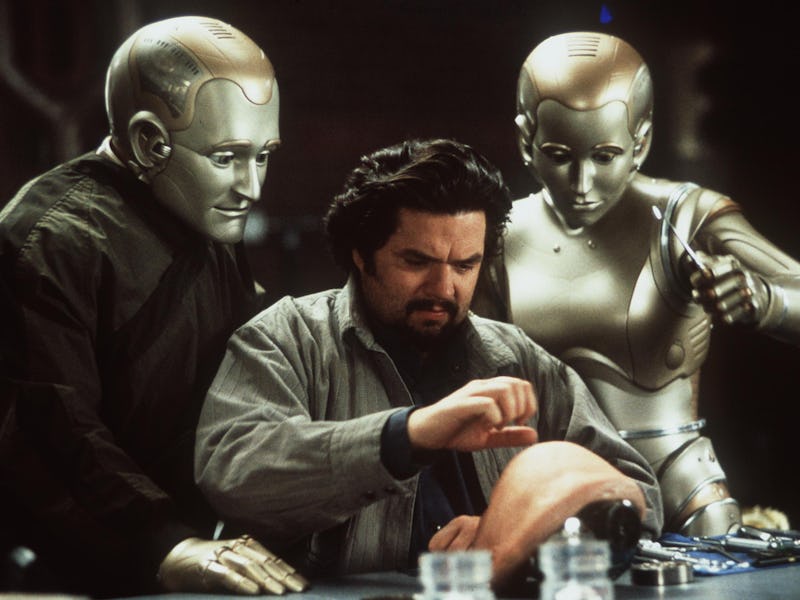Robin Williams’ Most Misunderstood Movie Challenges How We Think of Robots — and People
What’s in a robot?

It’s not until about an hour into Bicentennial Man that Robin Williams is allowed to use the most important tool at his disposal: his amazingly expressive face. Playing a robot who longs to be human isn’t easy — just ask Brent Spiner or Tricia Helfer — but one of the biggest barriers to entry is just how robotic movies and TV shows tend to make their robots.
In 1999, Bicentennial Man split the difference and allowed Williams’ robot to look more organic as time passed, but there’s something about the design of Andrew at the movie’s outset that doesn’t really represent its nuance and intelligence. Today, if you can look past some of the design choices of Bicentennial Man, you’ll find an understated and tender sci-fi movie lurking underneath.
Bicentennial Man, currently streaming for free on Tubi, is worth revisiting simply because it’s a Robin Williams movie that people who love Robin Williams haven’t seen a dozen times. Mrs. Doubtfire, Dead Poets Society, and Good Will Hunting are cited as quintessential Williams, but Bicentennial Man is more rewatchable because it deals with themes most mainstream movies didn’t touch in 1999.
Introduced as a clunky robot servant in the futuristic year of 2005, Williams’ Andrew grows from mindless automaton to emotional being over two centuries spent struggling to understand what it means to be sentient. Andrew, whose body becomes increasingly lifelike to the point where he asks to receive fallible organs and blood rather than remain an immortal machine, dreams of being legally recognized as human, a quest that pushes society — and the viewer — to recalibrate just what constitutes a robot.
Bicentennial Man came out the same year as The Matrix, and just two years before AI: Artificial Intelligence, two movies that shaped the way audiences understood robot-themed science fiction. They were futuristic and high-concept, but while AI is close in tone to Bicentennial Man, it took place in a slick, cyberpunk-ish future, and didn’t make the crucial mistake of having its sympathetic robot protagonist look like a robot.
As seen here.
Based on the Isaac Asimov same-titled novella, the movie feels like a lengthy Black Mirror episode where the “what if” sci-fi question isn’t the story’s driving force, but instead a test to see how much the audience can sympathize with its robot lead. Robin Williams was a brilliant actor capable of drawing us into complicated characters, which means Andrew should have been a slam-dunk. And by the end, when Andrew appears more human, he is. This is a multi-generational movie in which Andrew gets upgrades as time goes on. He begins by looking like a cross between C-3PO and The Iron Giant, and ends up looking like, well, Robin Williams.
This epic sweep hits about halfway through. Williams dutifully wore the robot costume for the early portions, but his performances only come alive after he begins to look more human. This leads to the central issue faced by all robot movies trying to tug at our heartstrings; if their robots look too goofy, the story doesn’t work.
This is why Data or Battlestar Galactica’s Cylons click; they look outwardly human. But in Bicentennial Man, the robot Robin Williams doesn’t feel as real as the human-looking Robin Williams, which robs the movie’s first half of potential audience investment. But this is also what makes the movie smart.
As the movie progresses, Andrew starts to become recognizable and relatable.
Had we started Andrew’s journey by making him look human, then it would have been easier for us to sympathize with him and make his journey toward being recognized as a human smoother. But Bicentennial Man doesn’t want you to feel comfortable. It wants the opposite, which is why having Andrew look so absurd for the first half of the film is brilliant. This might work with audiences today, but in 1999 it was a bit too subversive.
Not everything about Bicentennial Man works, and you can imagine a slightly smoother version with different aesthetics. But the movie is both bold and small which, in a world of increasingly massive sci-fi movies, is something we could use more of. Robin Williams is still missed, and overlooked gems like Bicentennial Man prove it takes a special kind of performer to tell a sad tale of a robot who almost lived forever.